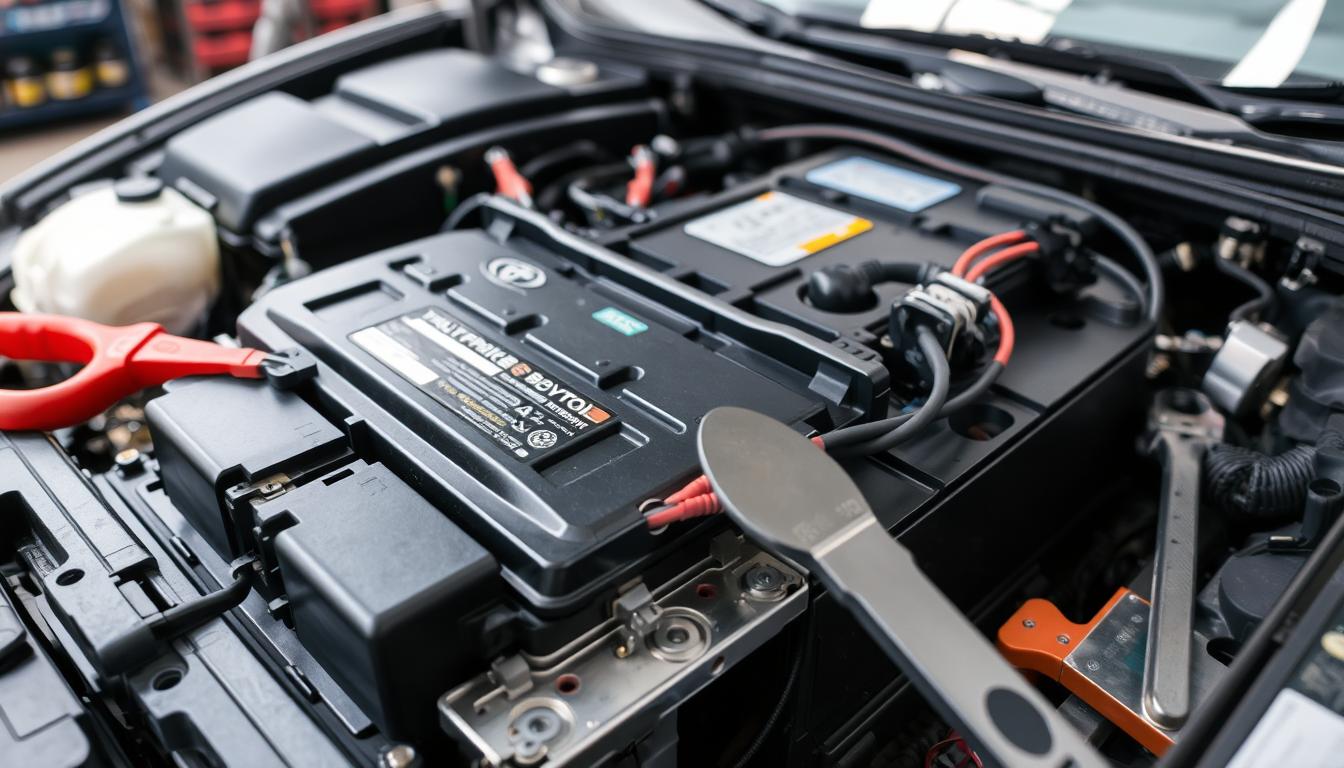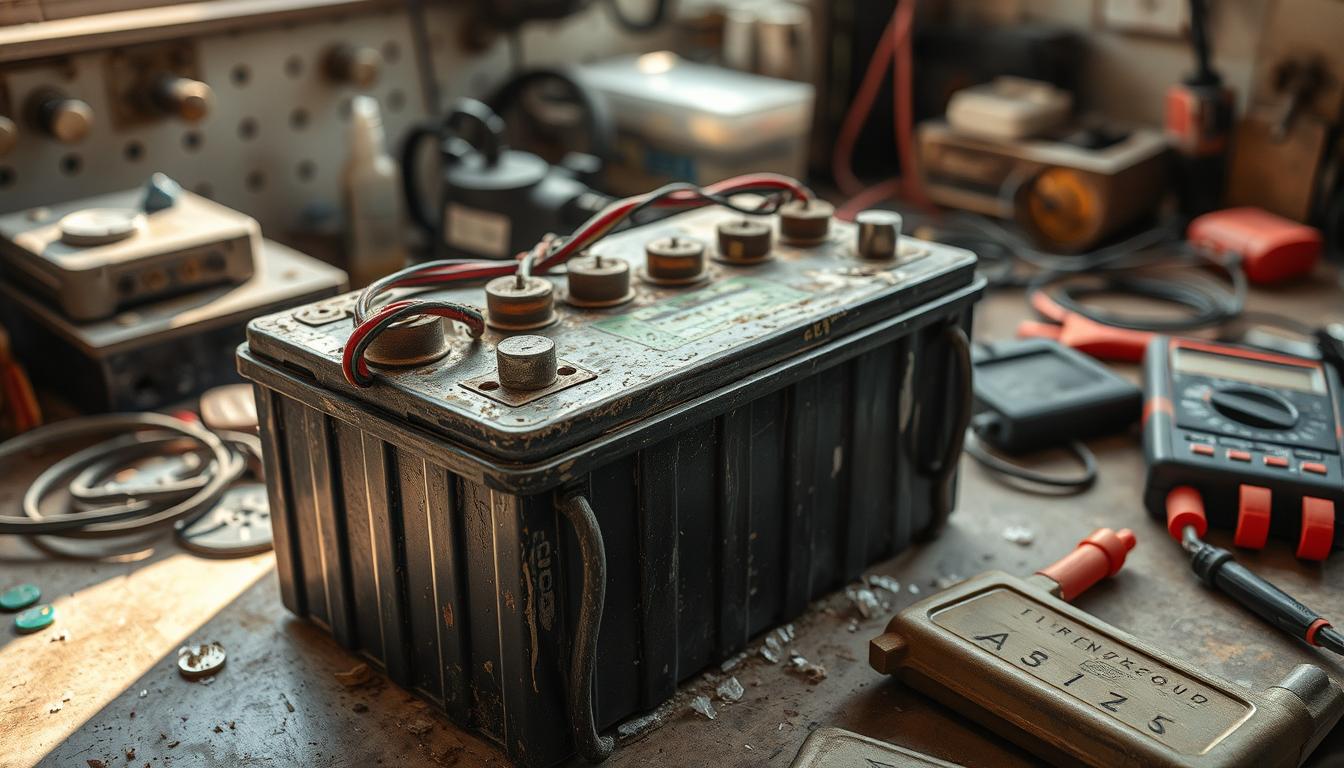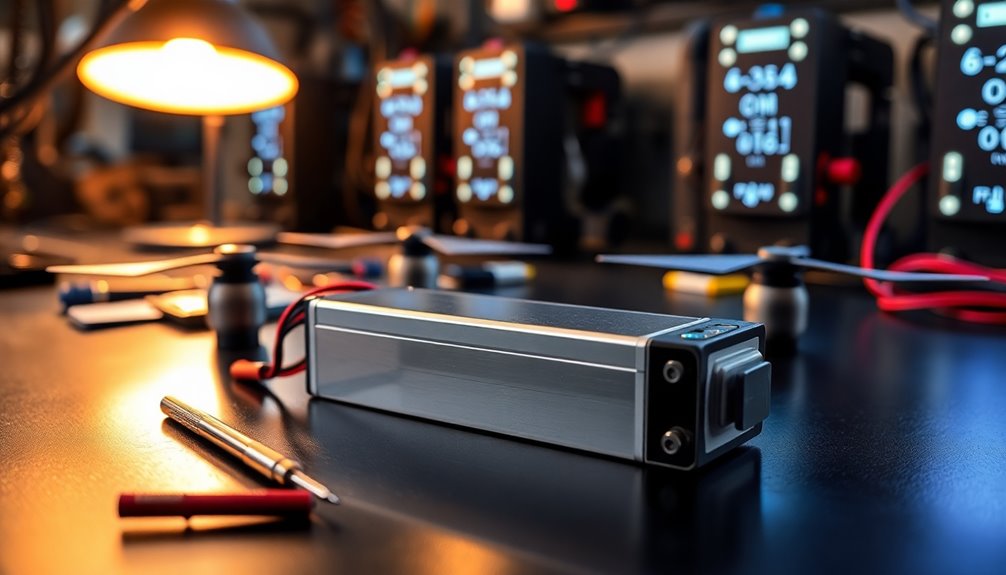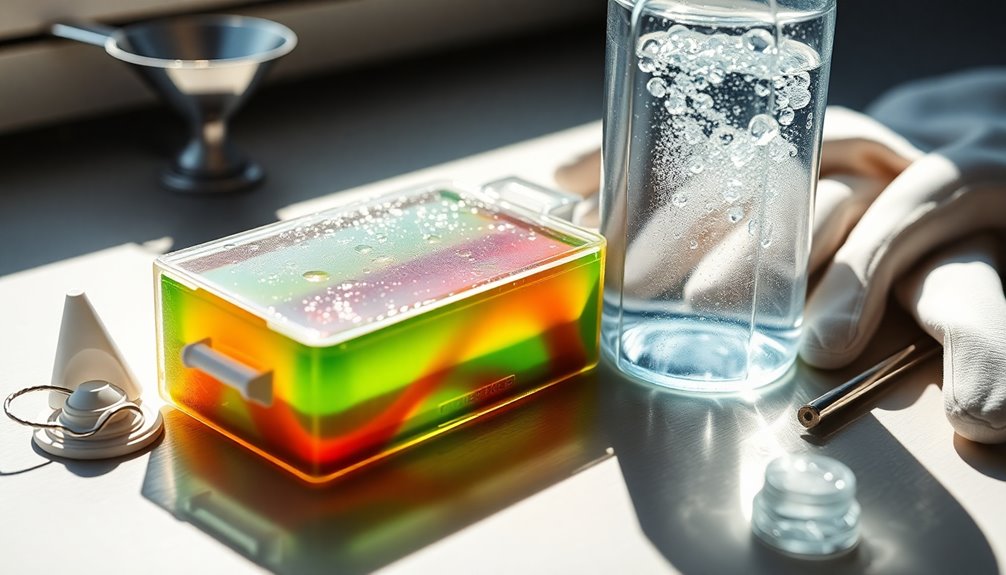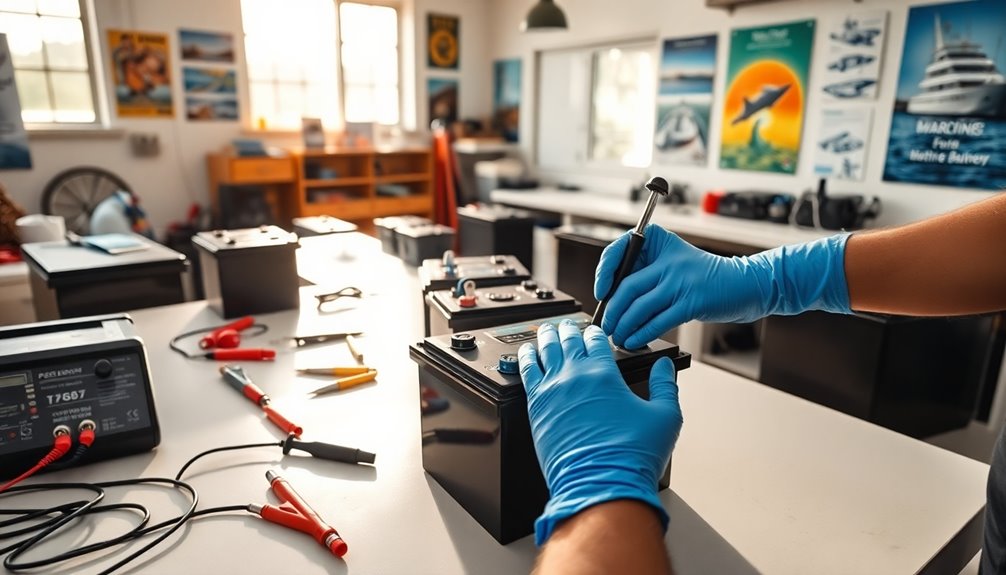Did you know that hybrid vehicles have seen a remarkable surge in popularity, leading to an increase in their usage worldwide due to their eco-friendly nature and fuel efficiency? This trend emphasizes the need for proper maintenance, especially focusing on prius battery reconditioning, which can significantly enhance the longevity and functionality of your vehicle. The battery is the core component of any hybrid car, and it’s susceptible to degradation over time, which can negatively affect performance and lead to eventual failure1. By understanding the ins and outs of Toyota Prius battery refurbishment, you can effectively extend the life of your battery and save on costly replacements. Additionally, utilizing reliable equipment like the ‘Prolong’ series of battery reconditioning tools is essential for successful DIY battery restoration1. As you explore this guide, you’ll discover straightforward ways to rejuvenate your Prius battery, ensuring it remains as durable and efficient as ever.
Key Takeaways
- Optimal care of your Prius battery is vital for enhancing vehicle performance.
- Regular maintenance helps prevent common battery issues in hybrid vehicles.
- Using reliable equipment can simplify the hybrid car battery restoration process.
- Recognizing warning signs can save you from more expensive repairs.
- Understanding battery degradation aids in better maintenance practices.
Understanding the Importance of Battery Maintenance
Maintaining the health of your Prius battery is crucial for ensuring optimal performance and longevity. Any neglect in battery care may lead to significant consequences, including reduced efficiency and costly replacements. Awareness of common Prius battery issues can empower you to take preventive measures and keep your hybrid battery in good condition.
Why Battery Care Matters
Regular battery maintenance can save you money. Reconditioning a hybrid battery can cost a fraction of the price of buying a new battery, which saves several thousand dollars2. On average, a hybrid battery lasts eight years or 100,000 miles, but it loses about 2% of performance annually3. Proper hybrid battery care not only restores performance but also can extend lifespan, making it essential for any owner.
Common Battery Issues in Prius Models
Many Prius models encounter prevalent battery issues, such as diminished capacity and increased internal resistance. Signs of deterioration may include decreased gas mileage and erratic charge holding, which indicate that reconditioning is recommended3. Furthermore, battery performance degradation leads to significant operational problems, showcasing the importance of proactive maintenance.
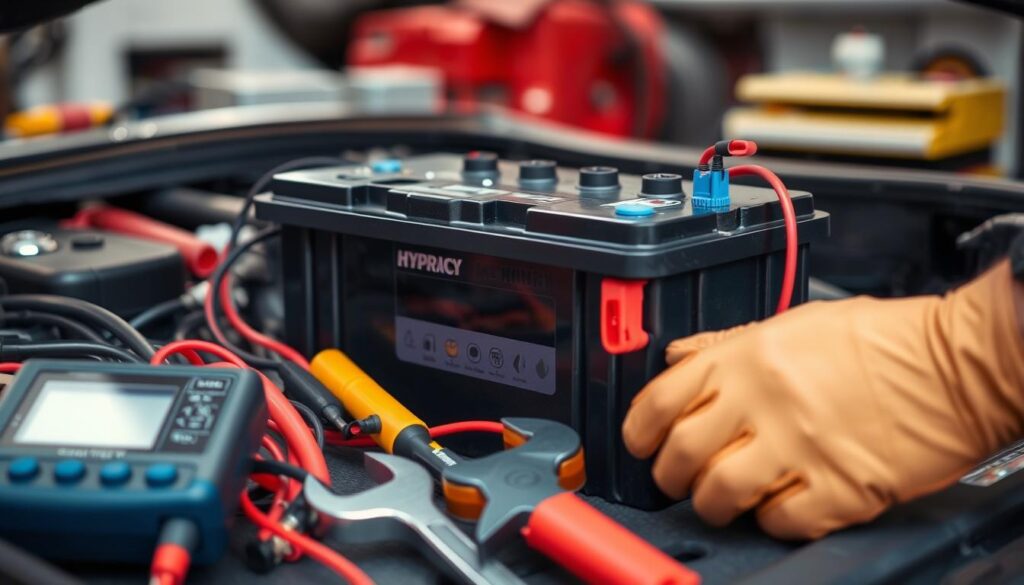
Signs Your Prius Battery Needs Reconditioning
Recognizing the signs that your Prius battery needs reconditioning can make a significant difference in your vehicle’s performance. Pay attention to the following indicators, which point towards possible issues with your battery.
Decreased Fuel Efficiency
One clear sign of battery reconditioning needs is decreased fuel efficiency. If you find yourself stopping at gas stations more often, this may indicate that your battery is not functioning optimally, leading to reduced fuel efficiency. It’s essential to monitor this change to act swiftly before further complications arise.
Warning Light Indicators
Look out for Prius battery warning lights, particularly the red triangle that signals critical battery problems. This light can often mean that your battery is struggling to hold a charge or is on the verge of failure. Ignoring these warning lights can lead to more severe issues down the line, making it crucial to address them promptly.
Unusual Noises or Smells
Unusual noises or smells can also be significant signs of battery reconditioning needs. Listen for any strange sounds, such as a constantly running fan noise, which could indicate that your battery is overheating. Any unusual odors may signal chemical reactions from a failing battery. Being vigilant about these signs can help you maintain the longevity of your battery and avoid costly repairs.
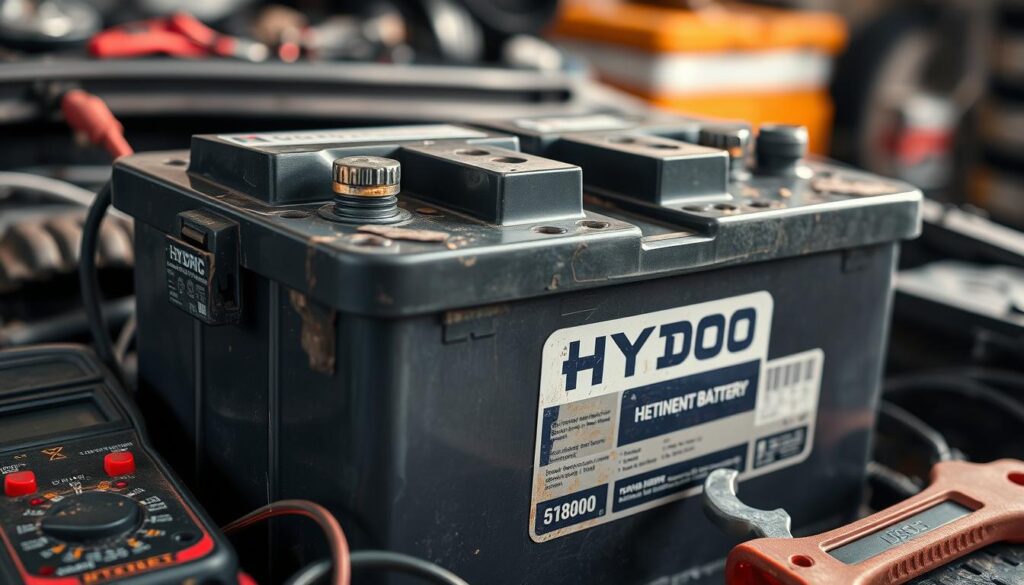
Tools You’ll Need for Battery Reconditioning
To effectively recondition your Prius battery, you need the right set of tools and safety gear. Utilizing appropriate tools for Prius battery reconditioning can significantly enhance the overall process and ensure safety. Being equipped with proper reconditioning equipment enables you to restore your battery’s functionality efficiently.
Essential Tools for the Job
When setting up for battery reconditioning, consider gathering the following essential tools:
- Charge-discharge cyclers
- Multimeters for voltage testing
- Battery terminal cleaning brushes
- Durable impact tools for safe handling
- Specialized software for battery capacity analysis
Each of these tools plays a critical role in ensuring a thorough and effective reconditioning process.
Safety Gear and Equipment
Safety is paramount during battery repair, so investing in high-quality safety gear for battery repair is crucial. Essential items include:
- Insulated gloves to protect your hands against electrical shocks
- Safety goggles to shield your eyes from potential sparks
- Protective clothing to cover skin during battery maintenance
Wearing suitable safety gear minimizes risks and helps you handle the battery with confidence.
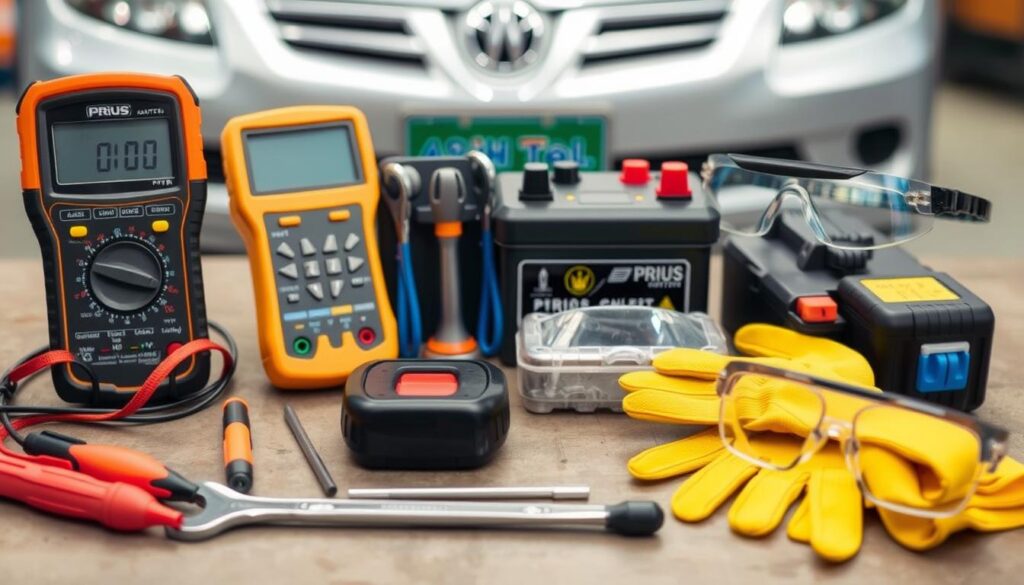
Step-by-Step Guide to Reconditioning Your Prius Battery
Reconditioning your Prius battery can significantly extend its life and improve performance. This guide outlines a clear, step-by-step battery reconditioning process that will have you ready to tackle the task with confidence. You’ll learn how to recondition a Prius battery, ensuring both safety and efficacy.
Preparing Your Workspace
Before diving into the reconditioning process, it’s essential to set up your workspace properly. A clean, well-lit area away from clutter minimizes the risk of accidents and allows you to focus on the task. Gather your tools and ensure that you have everything accessible to make the step-by-step battery reconditioning process smooth.
Removing the Battery Safely
Understanding the safe battery removal process is key to protecting both yourself and your Prius. Begin by disconnecting the power supply and removing any necessary coverings or components systematically. Following proper procedures ensures you handle the battery safely, preventing damage and hazards.
Cleaning the Battery Contacts
Once the battery is out, inspect and clean the contacts meticulously. Dirty connections can lead to poor conductivity, reducing battery efficiency. Utilizing appropriate cleaning solutions will help maintain the battery’s performance and longevity.
Reconnect and Test the Battery
After reconditioning, it’s crucial to reconnect the battery correctly and conduct tests. This step verifies that your efforts have paid off and that the battery is functioning optimally. Regular testing can alert you to potential issues before they escalate, ensuring a reliable driving experience.
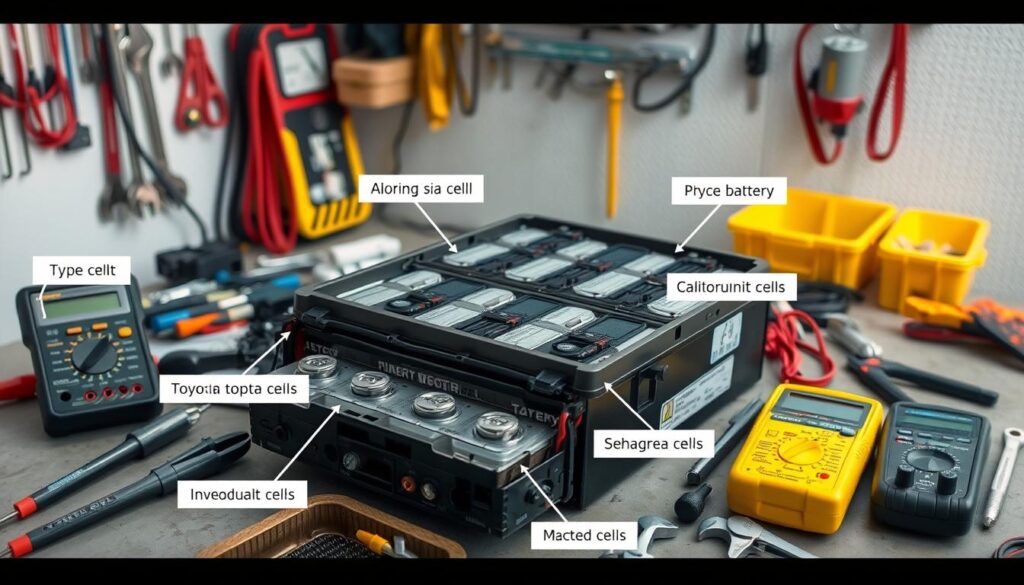
By following these steps, you can successfully restore your Prius battery and enjoy the benefits of enhanced performance and longevity. The process not only affords savings compared to new battery purchases but also contributes to environmental sustainability4.
Advanced Techniques for Battery Reconditioning
Exploring advanced battery reconditioning techniques will greatly enhance your ability to extend the lifespan of your Prius battery. Two key areas to focus on are cell voltage balancing and thorough battery capacity testing. Mastering these methods can help you maximize your battery’s performance and efficiency.
Cell Voltage Balancing Techniques
Cell voltage balancing is crucial in ensuring that each individual cell within the battery pack operates at its optimal level. This process avoids situations where some cells overcharge while others underperform, leading to reduced overall capacity. A high-quality balancing process typically requires a minimum of 20 hours for effective implementation2. With proper techniques, you can address voltage depressions that often contribute to capacity loss.
Capacity Testing Methods
Battery capacity testing should be an integral part of your reconditioning routine. This step helps you assess the overall health of the battery and make informed decisions about potential replacements. Regular testing can effectively double the expected life of a hybrid battery, allowing you to reap the benefits of a well-maintained system5. Investing in the right testing tools not only aids in accurate measurement but also provides peace of mind.
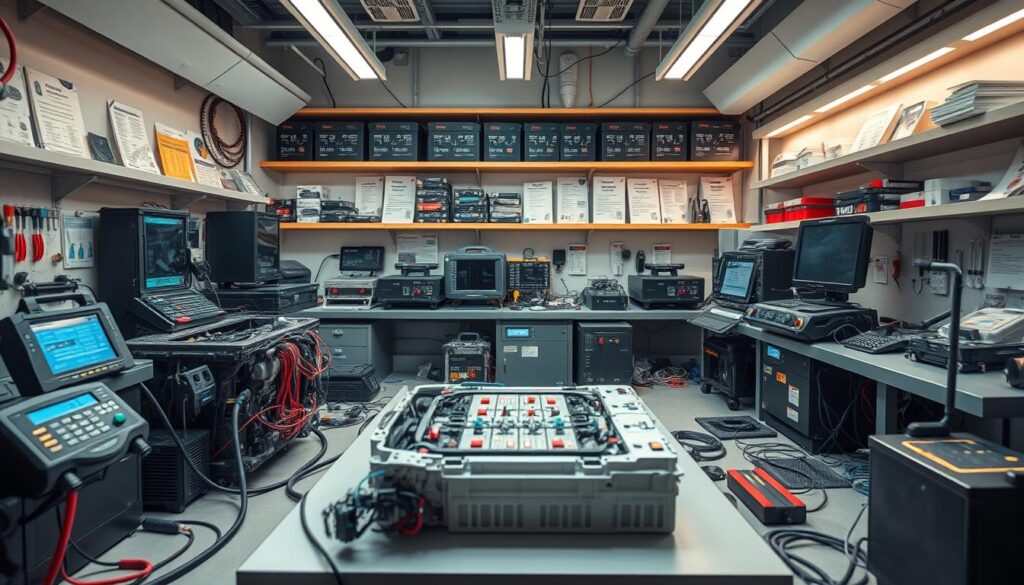
How to Maximize Your Reconditioned Battery’s Lifespan
To get the most out of your reconditioned Prius battery, it’s essential to adopt a proactive approach. By focusing on regular maintenance and incorporating best practices into your driving habits, you can effectively maximize battery lifespan. Below are some useful tips to help you maintain your battery’s health over time.
Regular Maintenance Tips
- Conduct regular tune-ups and battery testing at service intervals, which are crucial for your hybrid system’s longevity6.
- Store your battery in a cool environment to mitigate overheating risks and help preserve its life7.
- Monitor the battery’s power level, ensuring it stays between 20% and 80% to maintain optimal functionality6.
- Perform periodic physical inspections to check for damage or corrosion that could compromise performance7.
Battery Usage Best Practices
- Avoid deep discharges, as they can significantly shorten battery lifespan.
- Coast to a stop whenever possible to convert kinetic energy back into battery charge, which can extend its life6.
- Drive with moderate acceleration to minimize demand on the battery, especially in environments with extreme temperatures.
- Recalibrate your battery management system if you notice efficiency drops or power loss to optimize overall performance7.
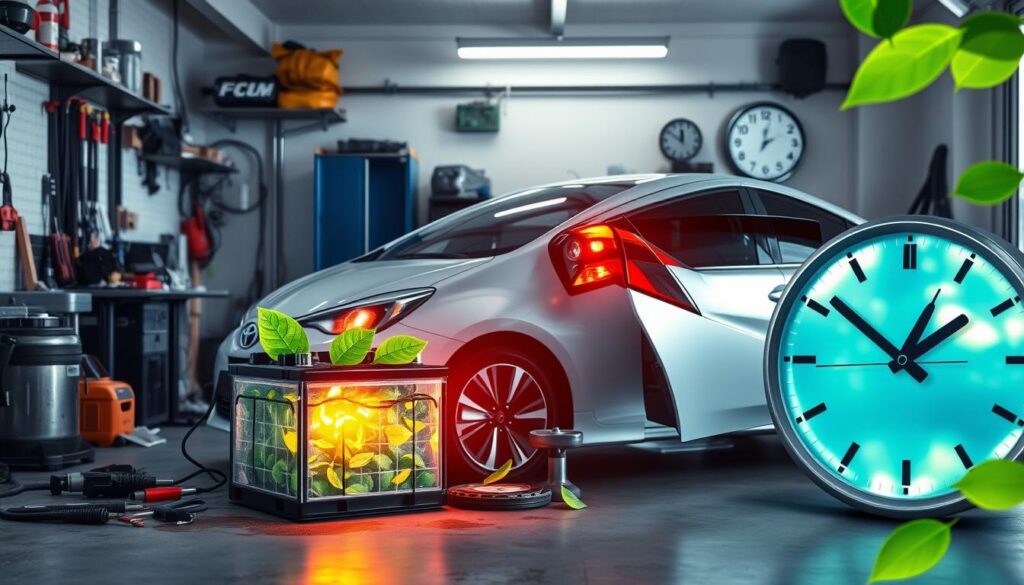
By following these Prius battery maintenance and usage best practices, you can extend the life of your reconditioned battery, ensuring it remains effective and reliable for years to come67.
Eco-Friendly Benefits of Battery Reconditioning
Reconditioning your Prius battery is not just a cost-effective solution; it also brings significant eco-friendly benefits. By choosing this path, you contribute to sustainability in battery reconditioning and promote reducing waste in the automotive industry.
Reducing Electronic Waste
The process of reconditioning directly combats the alarming rate of hybrid batteries ending up in landfills, where they contribute to environmental pollution. Hundreds of thousands of old hybrid batteries are disposed of each year, which adds up to a massive waste problem8. By rejuvenating batteries, you actively participate in reducing battery waste and lessening the overall environmental impact. When you opt for eco-friendly battery maintenance, you not only save money but also help mitigate the ecological footprint associated with battery disposal.
Supporting Sustainable Practices
Embracing sustainability in battery reconditioning means acknowledging the financial and environmental benefits. Reconditioning provides a prompt and uncomplicated method to extend the usability of a battery, especially in times when new batteries may be hard to find9. Additionally, rejuvenated batteries can improve fuel efficiency, enhancing the hybrid vehicle’s ability to transfer energy to the internal combustion engine, which in turn increases mileage per gallon8. This proactive approach can save you thousands of dollars while supporting a greener future for all.
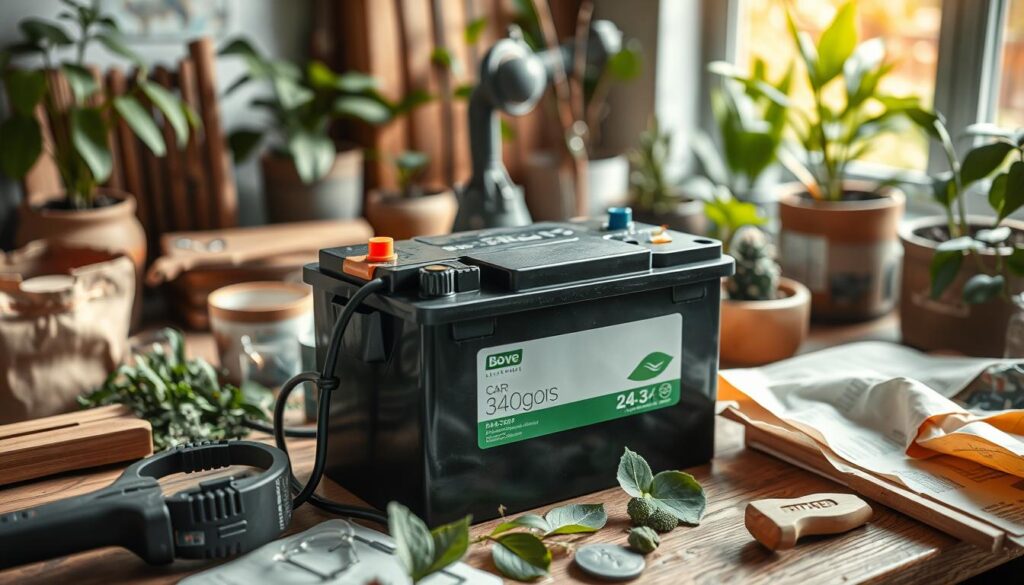
| Benefit | Description |
|---|---|
| Reducing Waste | Reconditioning helps significantly cut down on the number of old batteries that end up in landfills, thus reducing waste. |
| Cost Savings | Reconditioning can save car owners thousands compared to purchasing new hybrid batteries. |
| Fuel Efficiency | Rejuvenated batteries enhance energy transfer, improving fuel efficiency and prolonging the battery lifecycle. |
| Sustainable Practice | Rehabilitating existing batteries supports sustainable practices by promoting reuse over replacement. |
By investing in the reconditioning process, you not only enhance your vehicle’s performance but also play a vital role in fostering a more sustainable automotive industry98.
When to Seek Professional Help
Taking on battery reconditioning can be a rewarding endeavor. Yet, recognizing when to seek professional battery help is crucial. Certain indicators signal that you may need a technician for Prius battery assistance.
Signs You Might Need Expert Assistance
Look out for these common signs that indicate professional battery help is necessary:
- Persistent performance issues: If you experience ongoing problems despite reconditioning efforts, it might be time to consult experts.
- Warning lights: A dashboard warning light, such as the Malfunction Indicator Lamp (MIL), can signal deeper battery problems that require specialized attention.
- Irregular battery behavior: Unusual noises or erratic behavior on your Prius’ display can be a clue that something is amiss.
- Decreased fuel efficiency: A sudden drop in the fuel economy could indicate a battery needing professional evaluation.
Finding a Qualified Technician
When you’re ready to get the assistance needed, follow these steps to find a qualified technician:
- Research: Look for mechanics who specialize in hybrid or Prius models. Their experience may make a significant difference in service quality.
- Check reviews: Read customer reviews and testimonials to gauge the reliability and expertise of the technicians.
- Ask for recommendations: Consult friends or online forums for recommendations on trustworthy service providers.
- Get quotes: Contact multiple technicians for quotes. This will help you understand cost factors and potential warranties on services.
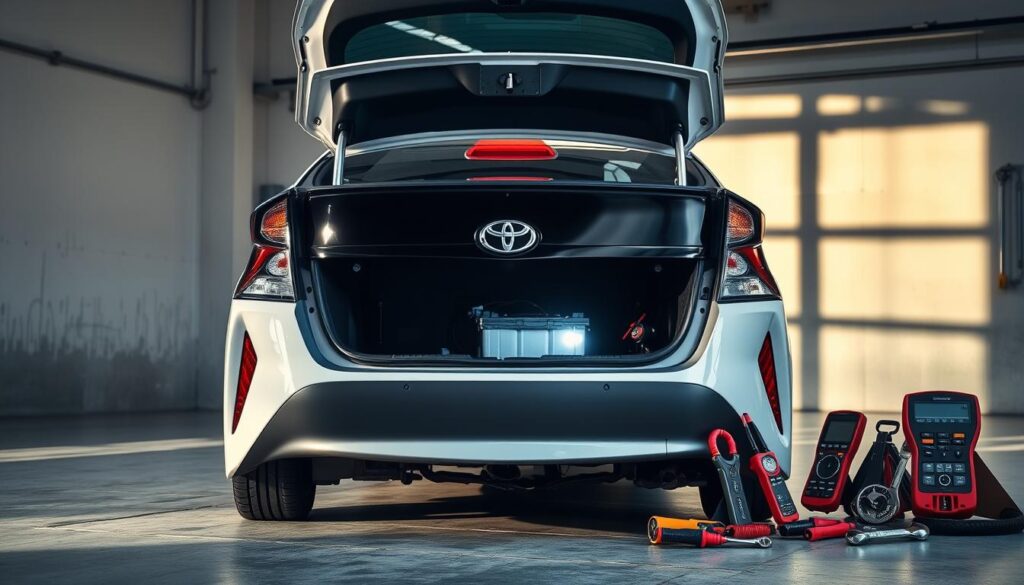
It is wise to recognize when to consult experts for your Prius battery needs. Aiming for the best service ensures that you get the most reliable performance from your vehicle101112.
Cost Considerations for Reconditioning vs. Replacement
Understanding the financial aspects of reconditioning your Prius battery versus purchasing a new one can significantly influence your decision-making process. As a vehicle owner, it is vital to weigh the costs carefully to find the most beneficial solution for your budget.
Comparing Costs of Reconditioning and New Batteries
Reconditioned batteries are generally more affordable than new ones, making them a cost-effective option for budget-conscious consumers13. The cost of replacing a Toyota Prius battery can range from $1,000 to $4,000, reflecting various factors such as battery type and warranty coverage14. On the flip side, hybrid battery reconditioning costs between $499 and $1,890, depending on the extent of the repairs needed15.
| Battery Option | Average Cost | Average Lifespan |
|---|---|---|
| New Toyota Prius Battery | $1,000 – $4,000 | 100,000 – 200,000 miles (8 to 10 years) |
| Reconditioned Battery | $499 – $1,890 | Potentially extended lifespan through reconditioning |
Long-Term Savings with Reconditioning
Opting for a reconditioned battery can lead to significant long-term savings, especially given the up-front costs associated with a new battery13. While new batteries often offer peak performance and efficiency, reconditioned batteries can maintain the original performance levels, prolonging the vehicle’s overall lifespan14. Additionally, reconditioning helps reduce the amount of hazardous materials disposed of in landfills, promoting environmental sustainability13.
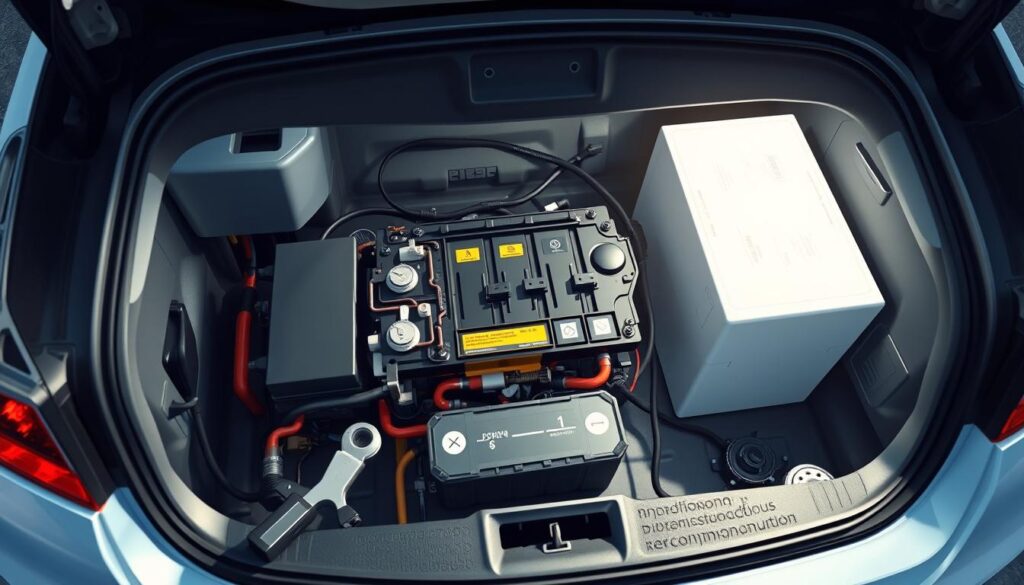
Conclusion: Empower Yourself with Prius Battery Care
By taking control of your Prius battery maintenance, you can significantly enhance the reliability and performance of your vehicle. The process of reconditioning your battery not only proves to be cost-efficient but also empowers you with the knowledge necessary for effective Prius maintenance empowerment. Considering the average shop sees at least one Prius battery failure each week, understanding proactive measures like reconditioning can be invaluable16.
Taking Charge of Your Vehicle Maintenance
Investing time in learning about battery care allows you to make informed decisions that could save you a substantial amount on repairs. For example, rebuilding a Prius battery can yield over $600 in savings compared to purchasing a brand new replacement that can reach upwards of $460017. By utilizing reliable Toyota battery resources, you equip yourself with strategies to extend the life of your vehicle and improve fuel efficiency after addressing battery issues.
Resources for Ongoing Learning
To keep pace with the advancements in battery care, consider seeking out manuals and guides tailored for your Prius model. Understanding the intricacies of your specific battery type will not only enhance your vehicle maintenance skills but also deepen your awareness of the key indicators of battery failure. With dedicated resources at your disposal, you can confidently navigate your Prius battery care journey and transform it into a rewarding aspect of vehicle ownership1617.

